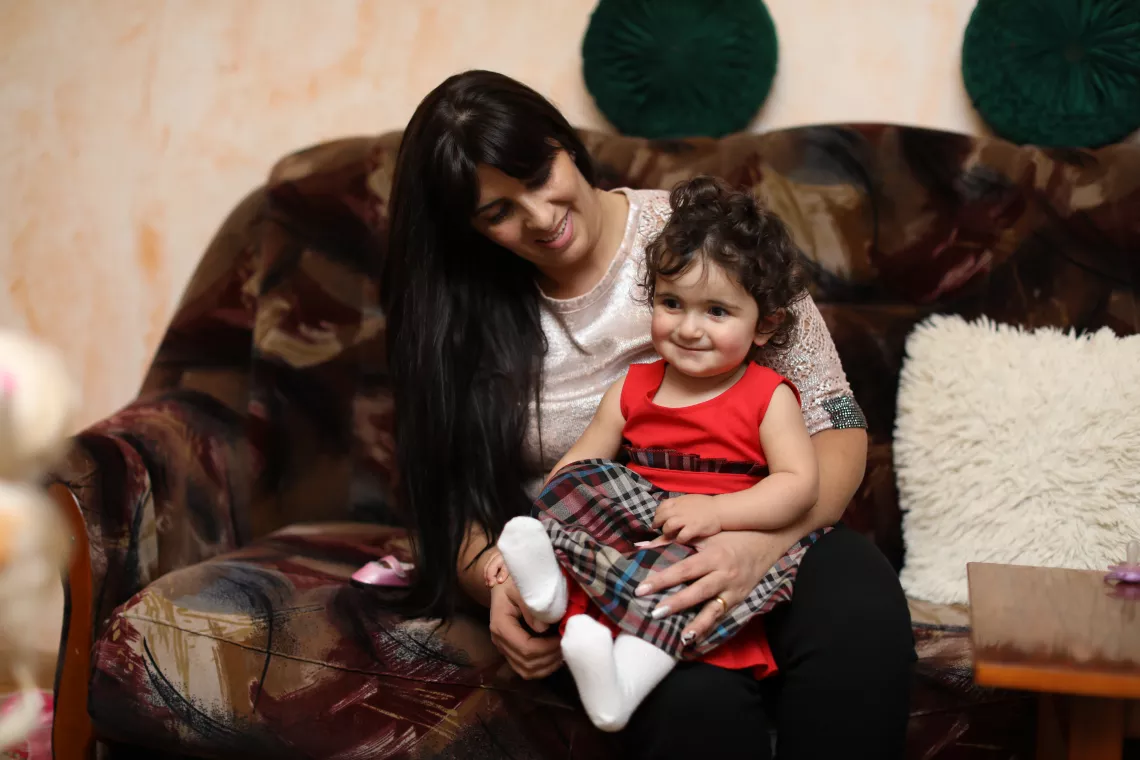A healthy start in life
How to overcome the myths and common mistakes in child care for new parents

- Available in:
- Հայերեն
- English
If you ask parents in Armenia what they want for their children, the most common answer would be, and perhaps in the entire world as well, — I want my children to be healthy and happy. The new generation of Armenian parents is lucky to be exposed to an overabundance of information on how to raise children, whereas for the generations before the primary source of information used to be older women in the community. However, there is still an issue with that — it’s hard to find trusted sources of information in Armenian online. Hence the problem with lack of knowledge persists. In fact, we could write an entire book of myths on child care and nutrition on Armenia.
Before launching a new wave of training sessions for new parents across the nation in 2018, UNICEF asked parents in each region standard questions to test their knowledge on child care and nutrition. And no region was the same! Parents in Kotayk were the least informed on breastfeeding. Lori parents needed a lot more info on vaccination, while parents in Tavush region were not aware of how to prevent and deal with iodine deficiency. Nutrition questions were the hot topic in Shirak — when to introduce meat to the baby’s diet or when to introduce to sweet compotes. The age-old practice of swaddling was another myth to dispel.
In Spring 2018, UNICEF and the Ministry of Health teamed up in a “For Every Newborn” project to get quality information on child care and nutrition to parents in all regions across Armenia. The goal was not only to guide new parents in critical child care issues to enable a healthy start for their children, but also strengthen their relationships with local healthcare providers — pediatricians, as a trusted source of information.

Satenik’s youngest daughter, Evelina, is 14 months old. Satenik participated in the training sessions in Gyumri. “We learned a lot about child care. While some things may seem less important in everyday life, I learned that they should not be ignored. For example, not all toys are safe to play with and we should be careful when buying them. There are toys that can be really dangerous for our children’s health, especially at a very young age.”
“We also learned about the power of correct nutrition — foods that are rich in iron, vitamins and other things important for the healthy growth and development of our children,” she added. “After the session, me and my husband have started paying more attention to how we raise our children. We now spend more time with our little one — we talk to her more often, play with and read fairy tales to her.” For Satenik, visits to the pediatrician are now also regarded as an important necessity that help her keep track of Evelina’s development.

In parallel to the sessions for new parents, a series of professional capacity building workshops were run for pediatricians and neonatal doctors. Altogether, around 650 pediatricians, family physicians and nurses in nearly 30 communities of Armenia took part in them.
“It is important that we not only treat our little patients but also inform their parents about proper child care at home, how to prevent certain health issues from escalating or how to know when to take the child immediately to a doctor,” says Narine Alexanyan, little Evelina’s pediatrician from Gyumri who took part in the workshops for doctors.

“We have seen far too many cases where parents turn to the doctors too late or prefer to take their children all the way to the capital city of Yerevan to get medical help, which prolongs health issues and makes it harder for all three sides — the baby, parents, and the treating physician. So, we worked aiming to build trust in each community, where parents and physicians can work together to provide a healthy start to the little ones,” says Gor Petrosyan, workshop trainer from the Family Academy NGO.
Caring for your new bundle of joy is perhaps an endlessly happy, yet immensely important and often challenging time in life. Critical to saving newborn lives is ensuring that every mother and baby is supported by a safe pair of hands — a well-trained doctor, nurse or midwife — during pregnancy, birth and beyond.
Check out babycef.am for reliable information in Armenian on nutrition and positive parenting!
Watch our Breastfeeding Video Encyclopedia to get expert information on breastfeeding, including tips on how to overcome some common issues!




